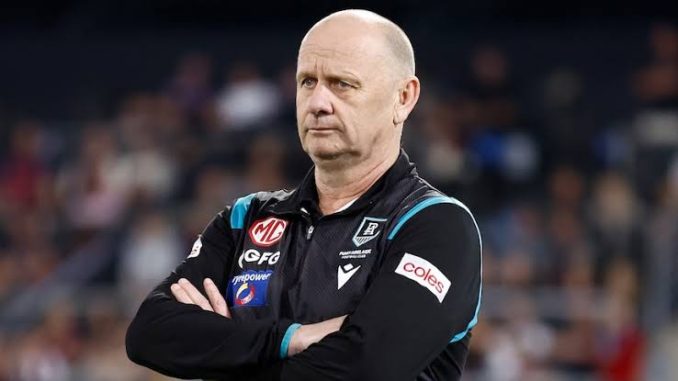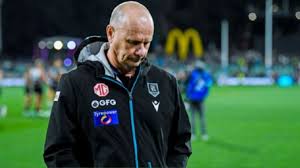
News Alert: Port Adelaide Football Head Coach Ken Hinkley Addresses Racism at the Club
In a powerful and candid statement, Port Adelaide Football Club’s head coach, Ken Hinkley, has opened up about the ongoing battle against racism within the club and the wider Australian Football League (AFL). Speaking at a press conference earlier this week, Hinkley expressed his commitment to tackling the issue head-on, highlighting the steps the club is taking to foster a more inclusive environment for players, staff, and supporters alike.
Acknowledging the Issue
Hinkley’s comments come in the wake of a series of incidents across Australian sport that have brought racism to the forefront of national conversations. As a highly respected figure in AFL, Hinkley’s words carry significant weight, especially given Port Adelaide’s reputation for promoting diversity and community involvement.
While Hinkley acknowledged that the club has made progress in addressing racial discrimination, he also recognized that there is much work to be done. “We can’t ignore that racism exists in all parts of society, including sport,” he said. “It’s a deep issue, and while we have taken steps to address it, we know we have a responsibility to do more, not just within the four walls of the club, but also in the broader AFL landscape.”
Port Adelaide’s Actions and Future Steps
Port Adelaide Football Club has long prided itself on its inclusivity, but Hinkley made it clear that racism is a challenge that requires continuous effort and open dialogue. He mentioned several initiatives that have been implemented in recent years to create a more welcoming and diverse environment.
One of the key programs the club has supported is the “Power to End Racism” campaign, which was launched in collaboration with Indigenous communities and anti-racism organizations. The initiative aims to educate fans and players about the damaging effects of racial abuse and promote the importance of mutual respect. In addition to these awareness programs, Port Adelaide has committed to ensuring a culturally diverse representation among both players and coaching staff.
“We are focused on education, and we will continue to provide our players with the tools they need to understand the impact of their words and actions,” Hinkley said. “It’s about creating a culture where everyone feels valued and respected, regardless of their background or ethnicity.”
Port Adelaide has also expanded its partnership with local Indigenous groups, providing pathways for young players from Indigenous communities to be involved in AFL pathways programs. These steps aim to break down barriers to participation, fostering a more inclusive and representative talent pool in the sport.
The Role of Leadership in Addressing Racism
As head coach, Hinkley understands that leadership is crucial in challenging the status quo. His approach has been one of empathy and openness. He explained that, as a leader, it’s important to be aware of any behavior that could perpetuate racism or discrimination, both on and off the field.
“The conversation must begin with us as leaders, both on the field and in the locker rooms,” he said. “If we can create a culture where players are comfortable to speak out, where we can hold each other accountable and ensure that respect is at the core of everything we do, then we’ll start seeing real change.”
Hinkley also emphasized that players themselves are crucial in driving cultural change within the team. As individuals with significant influence on the public, athletes have a responsibility to use their platforms to promote positive messages.
“We can’t afford to turn a blind eye,” Hinkley noted. “As a coach, I need to make sure the players understand that we will not tolerate racism in any form. Whether it’s from teammates, opposition players, or fans — it has no place in this club.”
The Wider AFL Landscape
Hinkley’s remarks are part of a larger movement within the AFL to address racism, following previous high-profile incidents that have rocked the league. AFL CEO Gill McLachlan and other league officials have made similar commitments to addressing racism, with the AFL introducing mandatory education programs for players and staff in recent years.
However, critics argue that more needs to be done at a systemic level to eradicate racism from the sport entirely. Hinkley agrees, stating that while the club and the league are moving in the right direction, it’s important to continue to challenge complacency and take meaningful actions.
“We all have a role to play,” he said. “This is about changing attitudes, not just policies. As a sport, we need to hold each other accountable and keep pushing forward.”
Ken Hinkley’s remarks are a significant step in the ongoing fight against racism in Australian football and sport more broadly. As Port Adelaide Football Club continues to lead by example, it is clear that the club is committed to using its platform to promote a more inclusive and respectful environment.
While Hinkley is optimistic about the club’s progress, he remains aware of the work still to be done. Through continued education, dialogue, and leadership, Port Adelaide aims to ensure that the sport remains a place where diversity is celebrated, and racism is no longer tolerated.

Be the first to comment